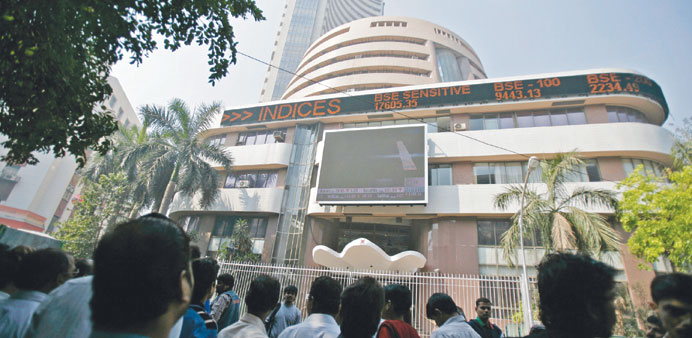Bloomberg
Mumbai
India’s sovereign bonds rallied, pushing the 10-year yield to a two-year low, and stocks rose the most in a week after the nation’s central bank surprised investors with bigger-than-expected cut in borrowing costs and eased curbs on foreign ownership of local debt.
The yield on government bonds due May 2025 slumped 11 basis points to 7.61%, the lowest closing level for benchmark 10-year debt since July 2013. The rupee gained 0.1% to 65.95 per dollar after weakening as much as 0.6%. The 30- stock S&P BSE Sensex increased 0.6%, erasing an intraday loss of 1.3%.
The Reserve Bank of India cut its main repurchase rate by half a percentage point to 6.75%. Most of the 52 economists surveyed by Bloomberg had predicted a quarter-point move, and just one made an accurate call. Governor Raghuram Rajan had faced growing pressure from the government to cut one of Asia’s highest borrowing costs as growth and consumer prices slowed amid the rout in global commodities.
“A 50-basis point cut was needed to kick start growth, and the decision reflects the RBI’s view that inflation will be under control due to low global commodity prices,” Shishir Bajpai, a director at Mumbai-based IIFL Wealth Management, which has $12bn under management and advisory. He reaffirmed the company’s bullish stance on companies tied to the economy. The Sensex erased losses soon after the central bank’s decision but traded little changed for up to two hours as emerging-market stocks sank to a five-week low amid a sell-off in commodity-trading companies. Gains in US equity futures, oil and copper later in the day helped the Sensex climb as much as 1.7%.
Global funds have pulled a net $2.4bn from Indian shares in this quarter, the highest since the period ended December 2008, as the turmoil sparked by China’s shock currency devaluation curbed demand for riskier assets. That’s put the Sensex on course for its biggest quarterly retreat in four years.
Seeking to stem capital outflows and give overseas investors greater access to Asia’s best-performing bonds, the RBI yesterday eased curbs on their purchases of debt. The cap will be raised in phases to 5% of outstanding stock by March 2018, and the move may attract Rs1.2tn ($18bn) of flows, the authority said. Overseas funds have almost exhausted the previous limit of $30bn, National Securities Depository data show.
“The higher limits could result in inflows of $5bn in the next six months alone, and this will help reduce fears of the rupee depreciating in line with other emerging markets,” Mihir Vora, Mumbai-based chief investment officer at Max Life Insurance Co, which has $4.8bn in assets, said by e-mail. The rupee will outperform other emerging-markets currencies, he said.

